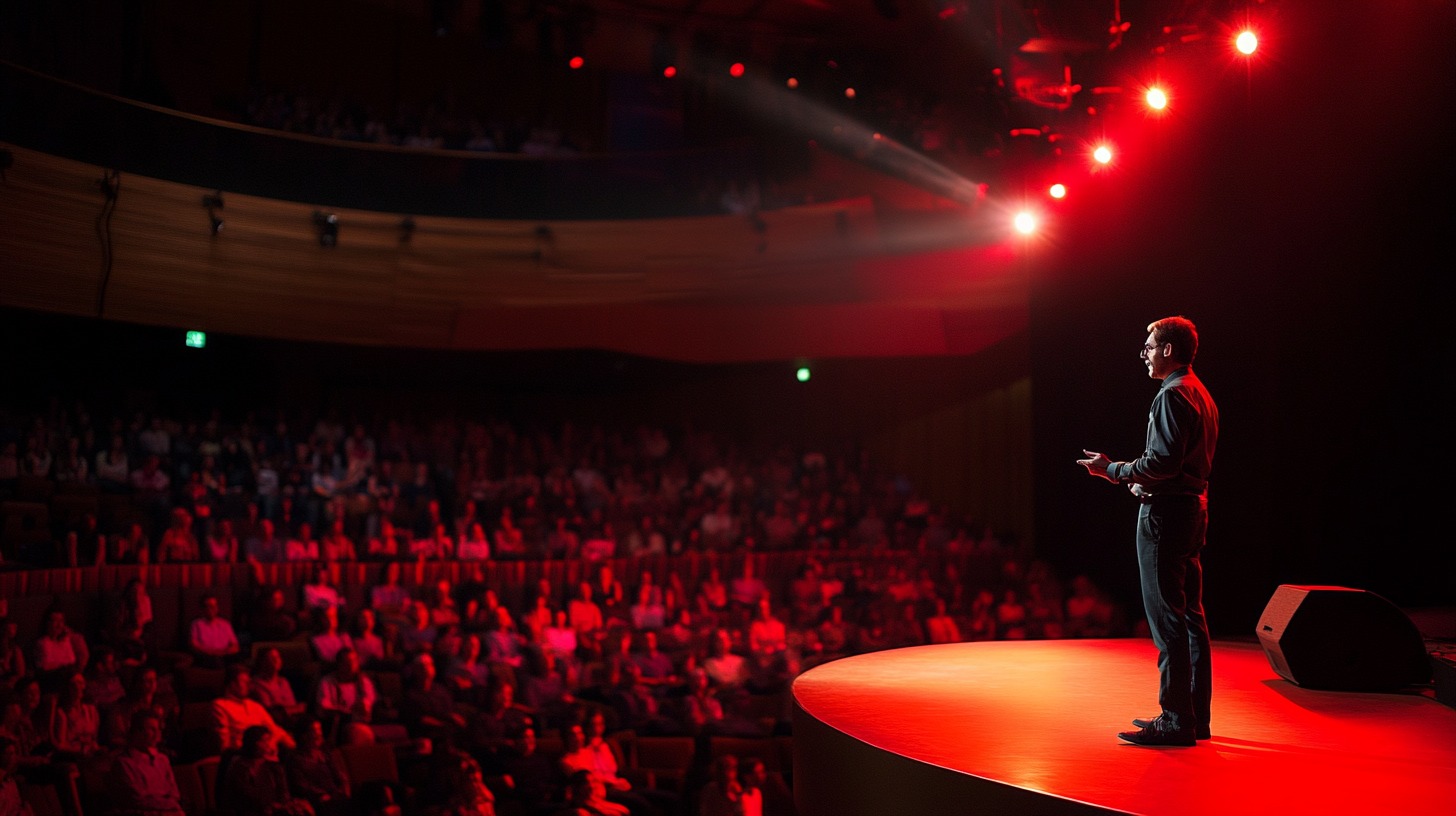Choosing the right speaker for your event is crucial to its success.
The speaker you select can significantly impact the overall atmosphere, the engagement level of your audience, and the achievement of your event’s goals.
A well-chosen speaker can elevate the event, leaving a lasting impression on attendees, while a poor choice might lead to disengagement and missed opportunities.
Identifying Your Audience’s Needs
Understanding your audience is the first step in selecting the right speaker.
Every audience has certain factors like:
- Demographics
- Preferences
- Expectations
For instance, an audience of young professionals might respond better to a dynamic, tech-savvy speaker who can address current trends in their industry.
A more experienced audience might prefer a speaker with deep industry knowledge and a history of professional success.
Identifying your audience’s needs also involves considering their interests and what they hope to gain from the event. If your audience is seeking inspiration, a motivational speaker with a powerful personal story might be ideal.
Conversely, if the event is more educational, a speaker with subject matter expertise and a strong academic background might be more suitable.
Different audience types also have varying preferences when it comes to communication style. Some may appreciate a formal, structured presentation, while others might prefer an interactive, conversational approach.

Setting Clear Event Goals
Before selecting a speaker, it’s vital to establish clear goals for your event.
For example, if the event is focused on professional development, the speaker should deliver actionable insights and strategies that attendees can apply in their careers.
Alternatively, for a more light-hearted event aimed at boosting morale, a speaker with a humorous and engaging style might be more appropriate.
The event’s goals will also dictate the content the speaker should provide.
An educational event might require a detailed, data-driven presentation, while a motivational event could benefit from a speaker who shares personal anecdotes and inspiring stories.
Clearly defined goals help ensure the speaker’s content is relevant and resonates with the audience, ultimately contributing to the event’s success.
Aligning the speaker’s message with the event’s objectives not only enhances the overall experience but also helps achieve the desired outcomes.
Criteria for Selecting the Right Speaker

Now let us take a look at the qualities of the speaker itself.
Experience and Expertise
One of the most critical factors in selecting the right speaker is their experience and expertise. A speaker with extensive knowledge in the relevant industry can provide valuable insights that resonate with your audience.
It’s essential to assess the speaker’s background, including their previous engagements and the reputation they’ve built over time. It ensures that the speaker is not only knowledgeable but also credible and respected within their field.
Industry-specific knowledge is particularly important for events that focus on niche topics. A speaker who understands the intricacies of the industry can offer more nuanced perspectives, making the content more relevant and engaging for the audience.
Furthermore, evaluating the speaker’s past performances can provide insight into their ability to connect with audiences and deliver content effectively.
Communication Skills
A speaker’s ability to engage and captivate an audience is just as important as their expertise. Strong communication skills, including the ability to tell compelling stories and present ideas clearly, are essential for keeping the audience’s attention.
A speaker who can weave personal anecdotes, humor, and interactive elements into their presentation will likely leave a more lasting impression on attendees.
Presentation style also plays a crucial role in audience engagement. Some speakers are naturally more charismatic and can energize a room with their presence, while others may excel in delivering complex information clearly and understandably.
The key is to find a speaker whose communication style matches the tone and purpose of your event, ensuring that the audience remains engaged throughout.
Personality and Presence
The speaker’s personality and presence can significantly influence the event’s atmosphere.
A speaker who exudes confidence and charisma can enhance audience connection, making the event more memorable. It’s important to consider how the speaker’s personality aligns with the event’s tone.
For instance, a corporate event might benefit from a speaker with a professional and polished demeanor, while a more casual gathering could be elevated by a speaker with a relaxed and approachable style.
Matching the speaker’s personality with the event’s tone helps create a cohesive experience. A speaker who resonates with the audience on a personal level can foster a stronger connection, making the event more impactful.
A speaker’s ability to adapt their presence to the audience’s mood and energy can enhance the overall experience, ensuring that the event leaves a positive and lasting impression.
Availability and Flexibility
When selecting a speaker, it’s crucial to consider their availability and willingness to engage beyond the keynote presentation.
A speaker who is open to participating in additional activities, such as panel discussions, workshops, or networking sessions, can add significant value to your event.
The level of engagement allows attendees to interact with the speaker more personally, enhancing their overall experience.
Flexibility is also important, especially when it comes to accommodating potential changes in the event schedule or format.
A speaker who can adapt to last-minute changes or unexpected circumstances demonstrates professionalism and reliability, ensuring the event runs smoothly.
Checking the speaker’s availability and willingness to go beyond their primary role can make a significant difference in the overall success of your event.
Budget Considerations

Balancing speaker fees with your event’s budget is another important factor in the selection process.
While high-profile speakers may come with hefty price tags, there are often alternative options that can be just as effective. We can’t blame the top guy, it’s a massive industry.
Emerging speakers or local experts can provide valuable insights at a more affordable rate, allowing you to allocate resources to other areas of the event.
It’s essential to weigh the cost against the potential impact on the speaker.
Investing in a high-profile speaker may be worth the expense if their presence is likely to draw a larger audience or elevate the event’s status.
However, it’s equally important to explore all options and find a speaker who fits within your budget while still delivering the desired impact.
Also, explore upcoming events that you should not miss if you’re in the networking world.
Researching Potential Speakers
Thorough research is key to finding the right speaker for your event. Start by asking the right questions, utilizing professional networks, speaker bureaus, and online platforms to identify potential candidates.
These resources often provide detailed information on speakers’ backgrounds, areas of expertise, and previous engagements, helping you narrow down your options.
Watching previous speeches or presentations is another crucial step in the research process.
It allows you to evaluate the speaker’s style, delivery, and ability to engage an audience. Additionally, reviewing audience feedback from past events can provide valuable insights into the speaker’s effectiveness and overall impact.
It’s also important to consider the speaker’s reputation within the industry. A speaker who is well-regarded and respected by peers is more likely to deliver a successful presentation that resonates with your audience.
Finalizing the Speaker Selection

Once you’ve identified the ideal speaker, the next step is to finalize the selection.
The process typically involves contacting the speaker, negotiating terms, and confirming their availability. It’s important to ensure that the speaker’s vision aligns with your event goals and that they understand the expectations for their role.
Drafting a clear and detailed contract is essential to avoid any misunderstandings. The contract should outline the speaker’s responsibilities, including the content they will deliver, any additional activities they will participate in, and the compensation they will receive.
Setting clear expectations from the start helps ensure a smooth and successful collaboration.
Finally, maintaining open communication with the speaker throughout the planning process is key to addressing any potential issues or changes that may arise.
The Bottom Line
Choosing the right speaker requires careful consideration and planning.
By understanding your audience’s needs, setting clear event goals, and thoroughly researching potential speakers, you can make an informed decision that enhances your event’s impact.
Thoughtful speaker selection is key to creating a memorable and successful event that resonates with all attendees.

